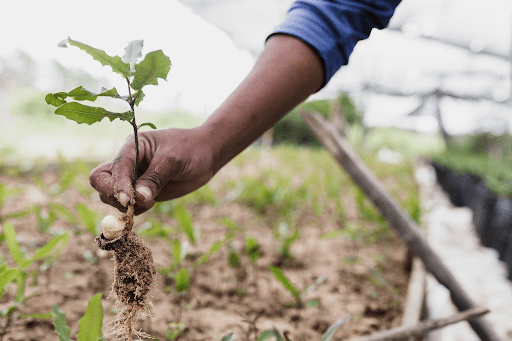Tree planting has been advocated internationally as the silver bullet for addressing numerous social and environmental challenges. Indeed, carefully planned tree planting combined with other approaches for preserving and enhancing forest cover can benefit humans and thousands of other life forms that rely on forests.
Trees provide an incalculable number of sustainable perks for the environment and its inhabitants. Trees are an essential natural resource for everyone, from young turtles learning to survive in the sea to farmers and their families laboring worldwide.
The question is, what ecological advantages do trees offer in our daily lives? And why must we plant as many of them as possible before it’s too late?
This post will discuss how planting trees can help solve social and environmental problems in 2023 and beyond. Please continue reading to discover more about the importance of growing trees and preserving them.
- Trees prevent soil erosion.
The environmental advantages of planting trees are sustainable. Wind and rainfall are the primary forces that cause erosion of exposed soil. When rainwater strikes the ground’s surface, it has sufficient force and momentum to get into the soil. Trees reduce the intensity of raindrops, thus avoiding damage to the soil.
The trees’ roots hold the soil firmly in place, preventing erosion from precipitation or cyclones. As a result, trees reduce the frequency of landslides in mountainous regions and stop the depletion of fertile land by reducing river sedimentation. Additionally, trees act as windbreaks and stop soil erosion.
Without trees, areas become arid and uninhabitable. Finding established trees for sale and planting them in such locations can transform them into oasis-like habitats that are more productive and habitable. Mangroves are well-known for preventing the erosion of vulnerable coastlines.

Image source: https://unsplash.com/photos/Gpf84hh6KLI
- Trees add more oxygen to our air.
Trees are one of the few irreplaceable resources on the earth that provide us with the oxygen we require to survive. Trees absorb carbon dioxide from the air through photosynthesis and release oxygen into the atmosphere as a by-product.
Thus, planting more trees may increase the oxygen and clean air available to humans everywhere. Our planet has tens of thousands of distinct tree species, and the amount of oxygen each produces can vary.
Planting trees helps safeguard the earth from the harmful impacts of greenhouse gases. In one year, an adult tree may absorb and store 13 pounds of carbon and convert 48 pounds into oxygen. One acre of trees can store around 2.6 tons of carbon dioxide annually.
Planting trees has far-reaching effects because of the heat they absorb and the clean air they provide for the person planting them and the entire community.

Image source: https://unsplash.com/photos/qwHHOC2z5Xs
- Trees protect the ozone layer.
Every year, we hear about global warming because temperatures are getting higher. This results from humans replacing trees with heat-absorbing structures and roads, which causes cities to become warmer. Since carbon dioxide is the most prevalent greenhouse gas, planting trees helps protect the ozone layer.
Please remember that the ozone layer, which exists high in the sky, is not the same as ozone pollution on the ground. The ozone layer in the atmosphere, which protects humans from the sun’s harmful UV rays, may have been depleted due to pollution from aerosol cans and refrigerants.
Ozone is a harmful component that may be seen as a thick layer of smog over some cities. When fossil fuels are burned, trees absorb the nitrous oxides that form ground-level ozone.
The presence of more trees reduces the potential environmental and health effects of ozone in the air. Once the gases enter the plant’s leaves, they are absorbed and broken down, releasing oxygen-rich gas into the atmosphere.
Planting more trees, especially around urban areas, can produce more breathable air and moderate temperatures. Therefore, trees are essential to human existence because they provide oxygen, shade our streets and homes, and reduce the ambient temperature.
- Trees help in conserving energy.
Trees assist in reducing the temperature and maintaining a cool environment. Energy costs for heating and cooling can be cut by as much as 30 percent just by strategically planting trees around buildings and houses.
This can save you much money on air conditioning costs while reducing carbon emissions and other contaminants from power facilities.
As a result of the harm caused by fossil fuels, many companies are emphasizing renewable energy sources. Trees can be an excellent eco-friendly fuel source if they are utilized sustainably. Urban trees absorb light energy and reflect it as heat, reducing the ‘heat-island’ effect.
As they lose leaves in the winter, deciduous trees provide cooling shade on sweltering days and winter warmth to buildings. They can cool the surrounding area and do the same for the entire planet. The evaporation of water from trees produces low-level clouds that reflect sunlight, thereby cooling the earth’s surface.

Image source: https://unsplash.com/photos/MfNHW8vlbLs
Concluding Thoughts
Tree planting is regarded as the most engaging and environmentally beneficial activity humans can engage in to improve the world. The planet has been using trees to combat climate change for eons. Without trees, life on Earth would not be possible. They offer long-term and short-term advantages.
Most people add trees to their gardens for their aesthetic appeal, connection to nature, or serene effect. However, trees have a more significant environmental impact than we may realize.
They improve air quality, slow down heavy rainfall and decrease flooding, prevent excessive heat, offer shelter, and remove carbon dioxide from the atmosphere.
Help keep news FREE for our readers
Supporting your local community newspaper/online news outlet is crucial now more than ever. If you believe in independent journalism, then consider making a valuable contribution by making a one-time or monthly donation. We operate in rural areas where providing unbiased news can be challenging. Read More About Supporting The West Wales Chronicle

























